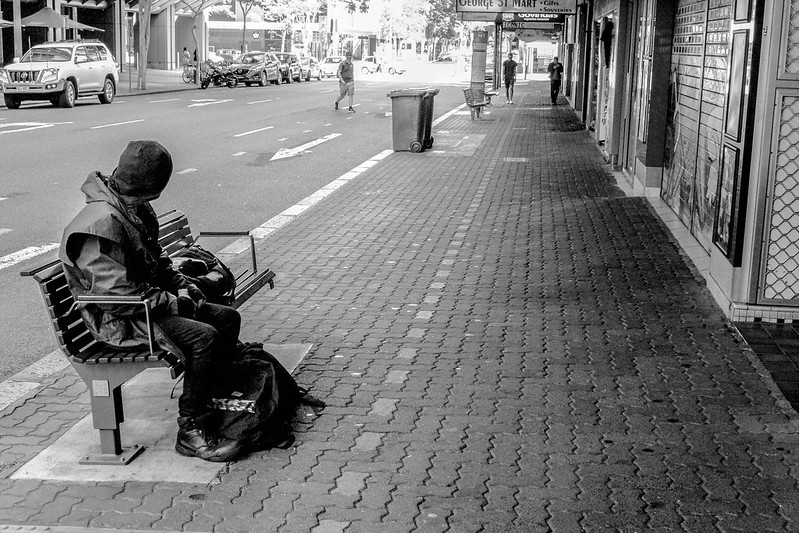Many people are hardly aware that at least 1.5 million people residing in the UK have no recourse to public funds. They include those whose visa status has not been determined but also those on temporary work permits, students, and those on the path to permanent residence. The term means what it says: if you are NRPF you are not eligible for services that are funded by government nor for income support except in certain limited extreme circumstances.
Well before the pandemic it had been recognised that large numbers of those sleeping rough were in this category and were therefore at best dependent on charitable rather than public support. But then the pandemic hit and NPRF immediately became a major issue for local authorities – especially in London.
By the end of April around 900 of those who had been accommodated by London authorities and the GLA under the government’s Everyone In initiative were thought to have no recourse – over 25% of those brought in in the first few weeks.
The big legal issue was obvious – did local authorities had any right to spend public funds on helping people without recourse. The question was initially fudged by being seen as a public health issue which was thought to enable funding to be provided. The MHCLG Select Committee reporting in April 2020 stressed the need for government to clarify the situation. However, the issue was not finally determined until March 2021 when the High Court ruled that Councils have the right to help those sleeping rough even where they have no recourse.
What is the current situation?
At the end of March 2021, the figures collected by London Councils suggested that there were still 735 people with no recourse in emergency accommodation – although this is thought to be an underestimate based on those whose situation was clearly defined. Importantly the numbers vary enormously between boroughs, with most outer London boroughs having numbers that can be counted on one hand, while some inner London boroughs still have 50 or more outstanding cases.
The GLA is in a particularly awkward position as it took in disproportionate numbers from insecure night shelters and has no accommodation of its own. The latest figures suggest that it still has over 900 people in hotels, of whom over 80% are thought to be NRPF. However, the London Council’s equivalent figure is only 165 – the very large difference representing those where there was continuing uncertainty as to their position.
What was made clear by the Minister at the Select Committee[1] was that MHCLG would abide by Home Office rules. Those who were not eligible for public funds would therefore once again ultimately have to depend on the charitable sector – from where many of they originally came into emergency accommodation.
More generally the GLA and local authorities have spent significant resources on trying to help people clarify and document their legal visa status. As a result, for some it has been possible to show eligibility so that they can be supported to move on from emergency to settled accommodation. Others face returning home as their only real option; and still others remain in limbo. From the point of view of the local authorities and the GLA it is a continuing financial burden.
Looking Forward
Many of those who have been rough sleeping over the last year (and there is plenty of evidence to show that numbers coming on to the streets have not declined)[2] – are young men who have lost their jobs in hospitality and other low paid insecure employment.
As the economy re-opens there is a lot of talk in the media about the hospitality industry facing labour shortages at least in the short term. So, one possibility is that for some of those in emergency accommodation the problem can solve itself. Those getting a job will remain NRPF and so not eligible for housing benefit to support them in settled accommodation – but at least they will be no worse off than before.
But it is not easy to go out and find a job when you are without a settled home. So perhaps what is needed most at the present time is for those in emergency accommodation to be given support to get back into employment. Some local authorities are already working on this more holistic approach. Once someone finds a job then with a bit of luck the home will follow.
However, there may well be many who were already in night shelters before Everyone In who will need longer term support. There are also significant numbers with mental health and other problems. Just keeping them in emergency accommodation cannot provide the answer. Local authorities need permission to spend public money to really solve the problem.
References
[1] Housing, Communities and Local Government Committee (2021), Protecting the Homeless and the Private Rented Sector: MHCLG’s Response to Covid-19 – House of Commons. Accessed 18 May 2021. https://publications.parliament.uk/pa/cm5801/cmselect/cmcomloc/1329/132905.htm.
[2] Whitehead, C. and Holman, N. (2021), London’s Experience of Homelessness under Covid 19. Trust for London blog. https://www.trustforlondon.org.uk/news/londons-experience-of-homelessness-under-covid-19
Access the full supporting study – Homelessness and rough sleeping in the time of COVID-19
Read the previous blogposts in this series
Read the supporting blogposts on Trust for London blog





